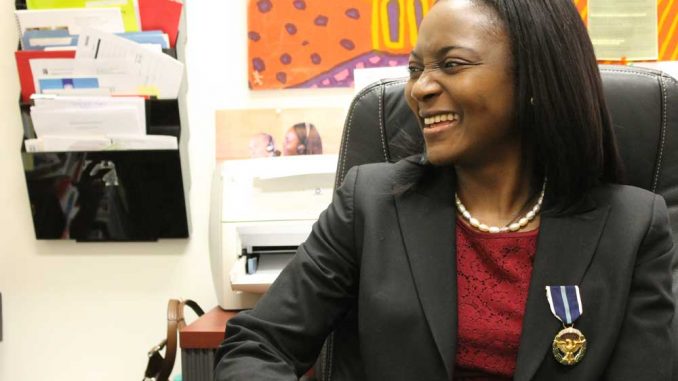
Patience Lehrman wants today’s immigrants to know she’s been there.
Leaving her native Cameroon for Washington state in 1997, Lehrman knows the strange looks. She’s been in unfamiliar surroundings, a new society and a new community that doesn’t know what to make of her. She knows the isolation.
“When I came here…there was no immediate reaching out,” Lehrman said. “It was the most difficult time in my life, the first six months I was here.”
Lehrman, who is champion of the immigrant integration initiative Project SHINE, or Students Helping in Naturalization and English, never let it get her down. She plugged away, met new people, opened closed minds and made a home where there wasn’t one. The Washington state community that once struggled to accept her cried when she left for the East Coast, a move that would ultimately lead her to Project SHINE, which has roots in Temple’s Intergenerational Center.
Now, as the program’s national director, Lehrman said it’s her mission to make sure other immigrants, particularly the elderly, don’t feel the same isolation that she did. Her efforts earned her a Presidential Citizens Medal and an audience with President Barack Obama in April 2012. She was presented the medal in February.
But, Lehrman said, the real award doesn’t come from the Oval Office. It comes from the work she does at Project SHINE.
“What gives me my greatest joy is when I can look in the eyes of the immigrant elders that we serve and see them happy that they’ve passed their citizenship test,” she said. “That is more than [the medal]. That’s what gets me up every morning.”
Despite the setbacks in her own integration, Lehrman said she never lost hope in the goodness of the American spirit, an ideal that was imparted to her by a young Texan Peace Corps volunteer in her native West Africa.
“All I saw about [the volunteer] and the country she represented was good, because that’s what she showed me and that’s what stayed with me,” Lehrman said. “When I came here and people were not very nice to me, a part of me refused to accept that that was the American reality…I told myself…if I only stayed true to that image I had in my mind of what was good about America, that I would transform those people and bring that good out of them.”
And somehow, she said, it worked. Despite the country’s perceived cynicism, Lehrman said, she thinks the American spirit is alive and well. She said Project SHINE is her way to encourage and foster it.
Started nearly 30 years ago by Temple’s own Nancy Henkin, founder and director of the university’s Intergenerational Center, Project Shine has emerged as a national leader in immigration integration. Creating connections and fostering acceptance across geographic, cultural and age barriers, Project Shine has taken root in more than 32 different communities in more than 30 states, and assists immigrants with everything from citizenship test prep to grocery shopping.
Although the organization focuses on immigration integration across the board, the program focuses specifically on bringing college students and young adult volunteers to elderly immigrants, many of whom have a harder time assimilating than their younger counterparts. Often times, Lehrman said, they are isolated behind a language barrier, left behind by younger family members who adjust more easily, and are often forced to abandon their own cultural heritage.
For Steve Calvarese, a 2012 alumnus and Project SHINE volunteer, the plight of elderly immigrants strikes a personal chord. His own grandmother emigrated from Sicily, and found herself struggling with the same challenges.
“There was a personal need for me to join SHINE so I can try to make the experiences of other immigrants better than what my grandmother had,” Calvarese said. “She gave up her language for her children.”
Calvarese currently volunteers at two Philadelphia-based Project SHINE sites. He said the experience has completely shifted his outlook, and gives meaning to his work.
It’s these experiences that Lehrman said are the backbone of Project SHINE. By facilitating relationships between two very different demographics, Lehrman said, Project SHINE is a vehicle for change and cross-cultural education. The elderly immigrant population is not always easily accessible for college students, but Project SHINE bridges the gap.
“SHINE…makes it that much easier for [Calvarese] and other students like [him] to be able to engage with a population that is not an immediate contact,” Lehrman said. “This is the richness of bringing these two populations together, and that’s what SHINE really represents.”
As Lehrman moves forward with Project SHINE, she’s glad for the recognition from Washington, D.C., but hope that it’s only the beginning of her achievements.
“Now, do I think I’ve performed extraordinary duties?” she asked, smiling. “I think I’m just getting started.”
Ali Watkins can be reached at allison.watkins@temple.edu.



Be the first to comment